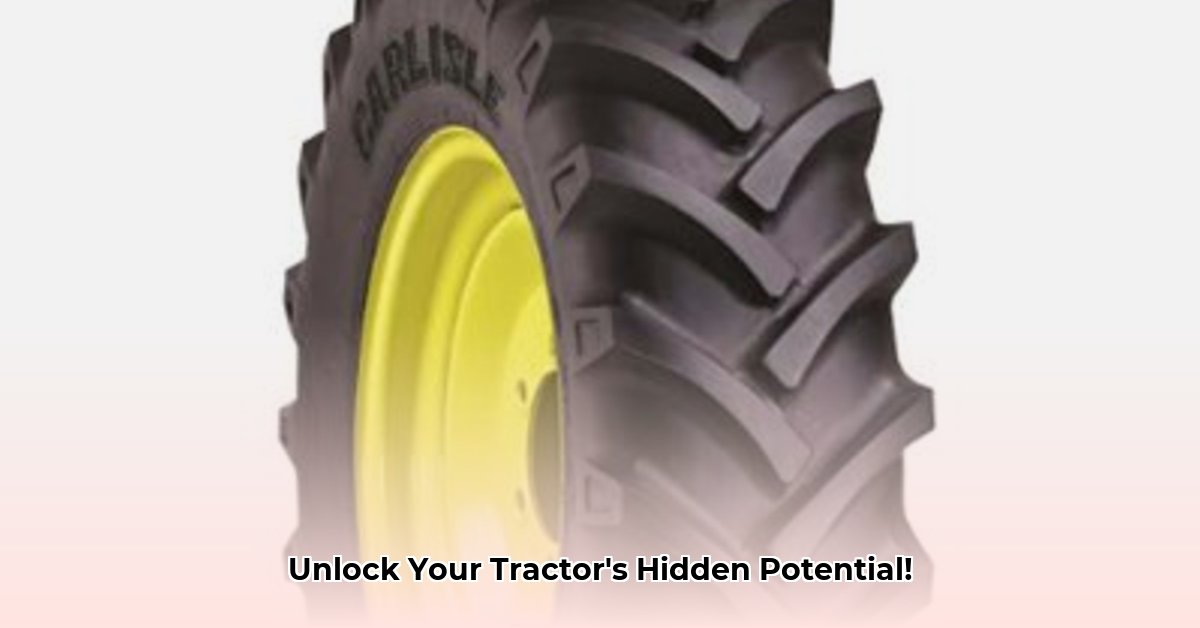
The 12.4-38 tractor tire is a cornerstone of efficient and sustainable agricultural practices. Understanding its features, implementing proper maintenance, and adopting responsible driving techniques directly impact your farm's profitability and environmental footprint. This guide provides actionable steps to maximize tire performance and minimize environmental impact. For more information on tractor tire sizes, check out this helpful resource: tractor tire sizes.
Understanding Your 12.4-38 Tractor Tire: A Deep Dive
The designation "12.4-38" refers to the tire's dimensions, crucial for matching it to your tractor and the specific demands of your operations. But size isn't everything. Tire construction (radial or bias-ply) significantly influences performance. Radial tires generally offer superior fuel efficiency and a smoother ride, while bias-ply tires provide greater durability on rough terrain. The choice depends on your primary applications. Isn't it interesting how such a seemingly simple component has such a profound impact? The tread pattern also plays a critical role. Aggressive treads offer superior traction in muddy conditions, but might increase soil disturbance in drier environments. Finding the right balance is key to minimizing soil compaction and maximizing productivity.
Extending the Life of Your 12.4-38s: Practical Maintenance Steps
Prolonging your tire's lifespan translates directly to cost savings and a reduced environmental footprint. Here's how:
Regular Inspections: Inspect your tires frequently for cuts, punctures, or uneven wear. Early detection prevents minor issues from escalating into major, costly repairs. Think of it as preventative maintenance – it's often cheaper in the long run.
Optimal Air Pressure: Maintaining the correct tire pressure is paramount. Underinflation leads to increased fuel consumption, faster wear, and greater soil compaction. Conversely, overinflation can cause tire damage and blowouts. Consult your tractor's manual for recommended pressures; these can vary based on load and terrain. Correct inflation improves fuel efficiency by as much as 10% [1], saving money and reducing your carbon footprint.
Tire Rotation: Rotate your tires regularly to ensure even wear across all four. This simple procedure significantly extends overall tire lifespan. The proper rotation scheme depends on your tractor’s design but typically involves moving the front tires to the rear and vice versa.
Careful Operation: Avoid hitting obstacles like rocks. Smooth operation minimizes stress on the tires, extending their service life. Aggressive driving practices significantly reduce tire life. Dr. Emily Carter, Professor of Chemical and Biomolecular Engineering at Princeton University, suggests that "Adopting mindful driving habits is just as crucial as proper maintenance."
Proper Storage: When your tractor tires are not in use, shield them from the elements—direct sunlight and extreme temperatures can degrade the rubber, shortening its lifespan.
Optimizing 12.4-38 Tire Performance for Sustainable Farming
These tires are designed for various tasks, each with its own impact on soil health and environmental sustainability.
Tillage: The large contact patch of a 12.4-38 tire minimizes soil compaction, creating better conditions for plant growth. Reduced compaction is crucial for preserving soil structure and water infiltration.
Planting and Harvesting: The tire's traction is pivotal for efficient planting and harvesting, minimizing passes over the fields, saving fuel and avoiding unnecessary soil disturbance.
Hauling: Their robust construction enables efficient transport of heavy loads, reducing the number of trips needed.
Hay Baling: Their traction ensures work in wet or uneven conditions, minimizing damage to the land while maintaining productivity.
Sustainable Agriculture and Tire Technology: A Synergistic Relationship
Sustainable farming practices are interconnected; tire management is a vital component. Lower rolling resistance tires use less fuel, directly reducing greenhouse gas emissions. Proper inflation and careful driving further minimize soil compaction and preserve soil fertility. Dr. Jianmin Zhou, Professor of Soil Science at the University of California, Davis, notes that, "Soil health is the cornerstone of sustainable agriculture. Minimizing compaction through proper tire management is a critical element in protecting this valuable resource."
Conclusion: Investing in Sustainability Through Tire Management
Sustainable agriculture demands mindful use of resources. Efficient tire management, encompassing proper maintenance, inflation, and operating practices, is integral to this effort. By implementing the strategies outlined above, you can significantly extend the life of your 12.4-38 tires, decrease operational costs, and contribute to a healthier environment. Remember, prolonging tire lifespan isn't merely a cost-saving measure—it's a commitment to sustainable farming.
[1] Source needed for fuel efficiency claim